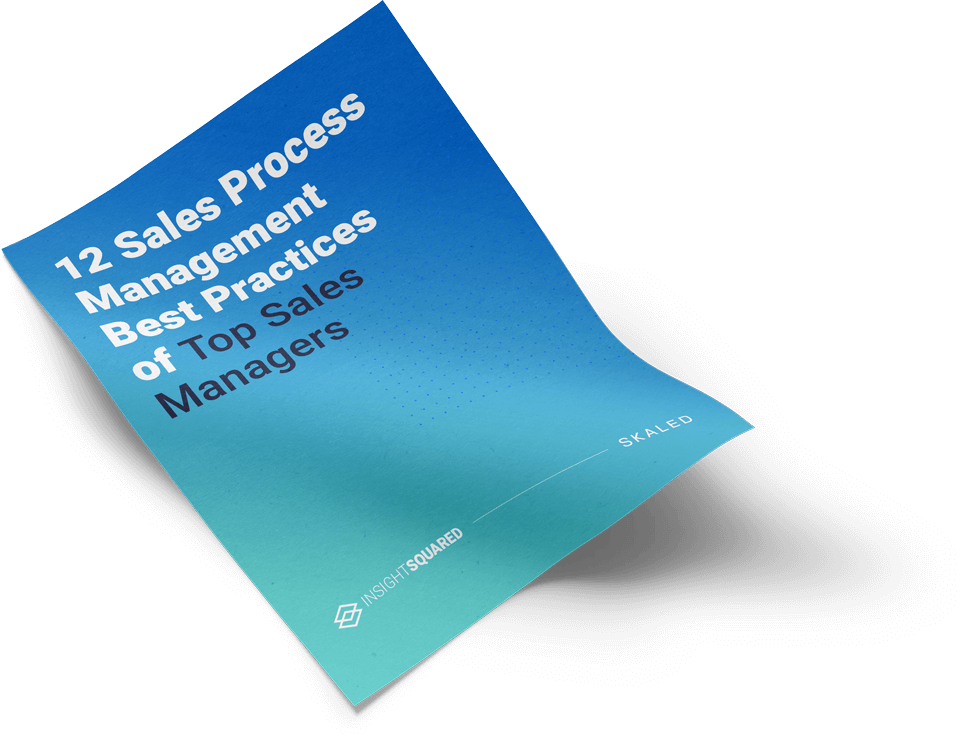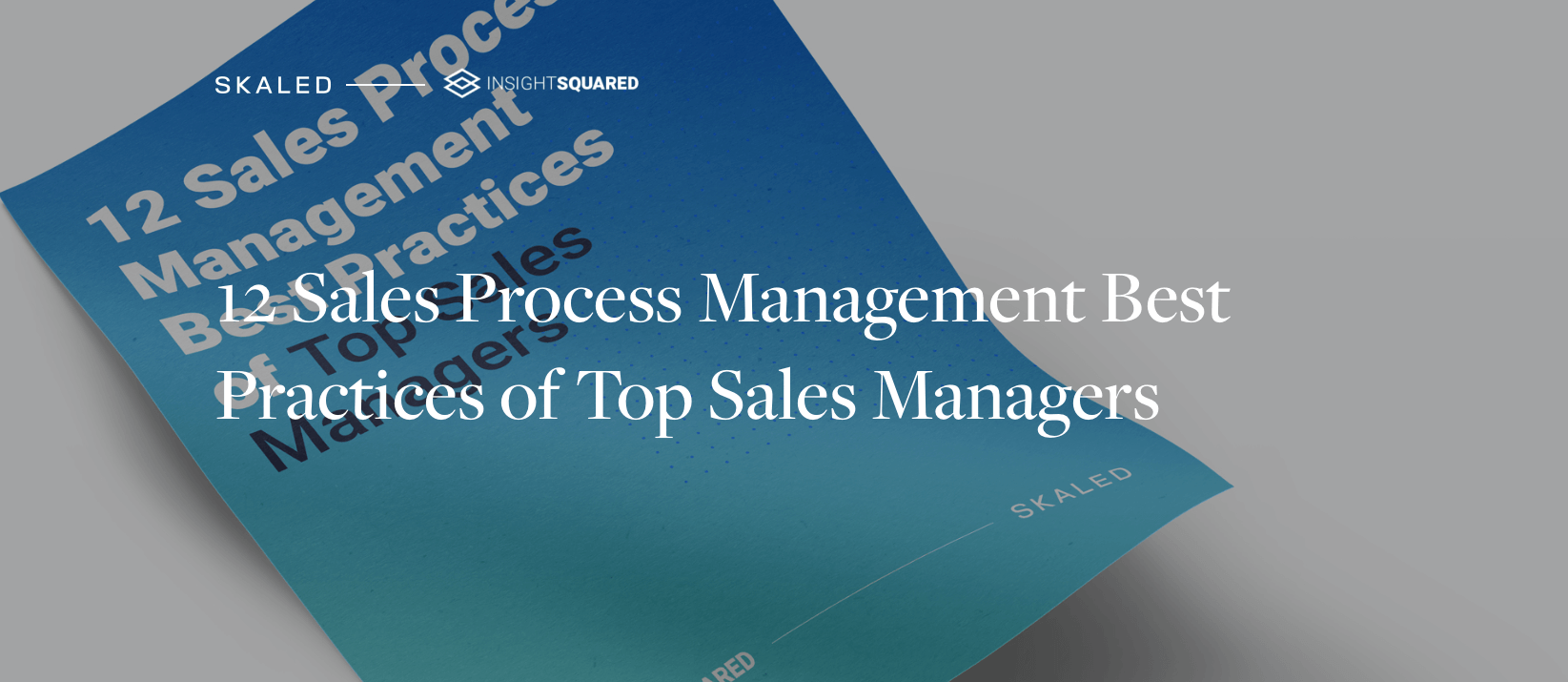
What is Sales Process Management? How Top Sales Managers Lead Winning Sales Teams
Ricky Cookson
Seasoned sales pros aren’t novices when it comes to sales process management. In one form or another, they’ve experienced some methodology for improving the sales process for their team and their own development. However, with the introduction of sales data and transparency into seller insights, the notion is evolving (and quickly). Sales process management is now guided by the abundance of data we can access at any time.
So, in today’s sense, what is sales process management? What are the defining qualities that encompass sales process management?
In collaboration with InsightSquared (a leader in revenue operations and analytics), we developed a guide to the 12 best practices for sales process management and discussed these concepts LIVE with InsightSquared CEO, Todd Abbott.
Download the 12 Sales Process Management Best Practices of Top Sales Managers
What is Sales Process Management? The Four Principles.
To put a bow on it – sales process or sales cycle management is the ability to monitor the buyer’s journey (and your reps) through each phase of the sales process.
Depending on your industry and company, defining that process will look very different. You’ll find several different opinions on whether there are 5, 7, 8, etc., stages or steps in the sales process.
In the webinar, “How Top Sales Managers Lead Winning Sales Teams With Coaching & Data,” Jake Dunlap (CEO, Skaled) and Todd discussed the four principles of sales process management: build, coach, drive, and exceed.
-
- Building dynamic relationships between management and your sales team
- Coaching reps to be top performers and build their skills
- Driving better results by reviewing and using the right data
- Exceeding targets and goals through continuous evolution
These principles can be applied to any sales process, no matter your number of stages or steps.
As you read on, you’ll notice that a key focal point in each of these principles is the use of data.
By leveraging data in tandem with the processes behind those principles, your sales process management will also become less gut-driven and “this is how it’s always worked” and more fact-driven.
How Top Sales Managers Lead Winning Sales Teams With Coaching & Data – Insights from the Webinar
A couple of minutes to fast-forward to if you’re short on time:
-
- 05:00 – best-in-class sales orgs establish a management system and culture to leverage their data and analytics.
- 12:31 – help your reps to understand the why.
- 29:37 – leverage systems to help you identify where you as a manager should and can spend time moving the needle.
- 43:53 – this may be controversial, but look at opps in terms of # of meetings instead of sales stage.
- 47:28 – managers have patterns too, and team trends tend to follow that of their manager.
Insight #1 Using Data to Build Better Processes & Team Dynamic
Data can lead your team toward incredible insights in every function and at every point in the funnel. It is now a catalyst for refining processes, building development paths, and strengthening internal and external relationships. Modern sales is at an apex of data innovation, wielding insights against inefficiency and static operations.
“The amount of data available to assess a deal, assess a funnel, or assess a sales process today versus what it was five years ago is fundamentally different.” Todd Abbott
By building effective sales intelligence and data flow processes, sales teams are freed from the constraints of sales ops and admin tasks. In doing so, sales reps can sell with a data-backed approach, and managers can coach their reps based on factual information.
Insight #2 Coaching Sales Reps Leveraging Data
Data has given way to a drastic change in the way sales managers coach their reps. Once upon a time, and still for many managers, sales managers would have to conduct a laborious interrogation and inspection of a rep’s pipeline generation and overall selling technique. However, through data, a less cumbersome method has been born.
Through tools like InsightSquared, managers can definitively show reps where they’re lagging, the cause, and the best way to fix it.
Likewise, sales reps have more of an opportunity to OWN their development. By providing these tools and insights to reps, they can intellectualize, take ownership, and change forecasts. They can innovate based on their dashboard and own their self-improvement.
Related Content: RevGenius Article: How to Use Data to Coach Your Sales Reps
Insight #3 A Collective Mindset for Driving Conversions
What is sales process management without data-backed themes to assess your team’s efficiency?
Not very effective, that’s for sure.
Sales data is a vital asset for how your team identifies themes and recognizes individual selling trends and user engagement. All of which serve to help drive better outcomes for sales reps and their customers. When everyone can point out processes that are pushing the team forward or holding the team back, driving efficiency and output becomes a team effort.
Insight #4 Exceed Your Targets Through Sales Process Management
The culmination of building, coaching, and driving a sales team through the lens of fact-based, data-backed insights enables better sales processes.
Taking feedback from sales data invites constructive and creative solutions for developing plans for both the team and individual reps. The exciting thing here is that sales data is a catalyst for proactive sales process management.
“When you have data and the insights, you’re forced to step up to your blind spots. You can’t rationalize your way out of data.” – Todd Abbott
In other words, you can’t hide from the reality of faulty processes when you have precise data illuminating them. While your team identifies problems, you’re also finding solutions; it’s cyclical and sustainable and beckons a new wave of sales process management.
The 12 Sales Process Management Best Practices of Top Sales Managers
The dive into modern sales process management doesn’t stop here. Skaled and InsightSquared have collaborated to put together twelve best practices of top-performing sales managers and quota smashing teams.
Use these 12 best practices if you’re looking to improve your process management methods and generate more revenue for your business.


